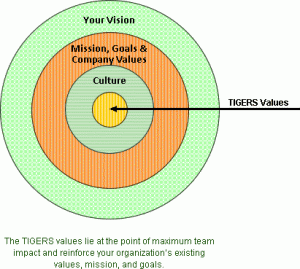 Leaders play an important role in organizations, as they help set the tone for the company’s culture and encourage team building, innovation and success from their team members. With such an important role, it’s important that leaders take the time to assess their current skill levels and identify areas that require attention. Whether you’re a seasoned pro or a freshly promoted newbie, there are likely some areas of your leadership skill that could use improvement. So, what are some team building tips to improve your leadership effectiveness?
Leaders play an important role in organizations, as they help set the tone for the company’s culture and encourage team building, innovation and success from their team members. With such an important role, it’s important that leaders take the time to assess their current skill levels and identify areas that require attention. Whether you’re a seasoned pro or a freshly promoted newbie, there are likely some areas of your leadership skill that could use improvement. So, what are some team building tips to improve your leadership effectiveness?
Leadership Mistakes You Might Be Making
With team building tips and strategies, you can improve your effectiveness as a leader. Some common mistakes you might be making include:
Promoting for the wrong reason.
Promoting based on tenure might seem logical, as those who have worked with the company the longest theoretically have the most experience. However, 82 percent of those hired into a management role based solely on tenure are unfit for the role. Gallup research finds that only about one in 10 people are naturally qualified to manage, so if you promote based on tenure rather than talent, you are likely making the wrong hire. So instead, leaders should look for the five attributes that highly talented managers possess: the ability to motivate employee excellence; assertiveness; the ability to promote a culture of accountability; strong relationships based on trust; and the ability to make decisions based on productivity. By focusing on these skills, leaders will hire the most qualified people for management roles.
Focusing on short-term success over long-term success.
Leaders negatively affect the success of their entire organization when they start focusing solely on short-term successes while ignoring long-term goals. An example of this line of thinking can clearly be seen with investing (money and time). On the stock market, are you investing only in companies that will help you hit your quarterly goals, or are you looking at the long-term profitability? When you train your team members, do you focus on quickly getting them up to speed so they can perform core job functions, or are you taking the time to invest in thorough onboarding that will best benefit your employee? Switch your thinking from just the short-term to the long-term to improve your leadership skills.
Alienating yourself from others.
Would you consider yourself an alienating leader? Probably not, but there are some traits you should look for to determine if you are. Alienating behaviors include a negative attitude, poor empathy, closed-off body language and incongruence between what you say and do (trust issues). If your attitude is overall negative and lacks empathy, your employees won’t feel inclined to approach you with problems they may be experiencing, which can create a non-supportive culture. Instead, focus on the positives in your life, and listen to your team members without judgment to change the environment. Closed-off body language, such as folded arms or a scowl, can be just as detrimental as a negative attitude, so pay attention to your stance as you converse with coworkers to make them feel welcome. And pay attention to the promises you make. If you say you’ll do something for your employees, make sure you do it to build trust and accountability in the workplace.
Having too low of standards.
Your personal standards, as well as the standards you expect of your employees, says a lot about your leadership. If you’re experiencing underwhelming success within your organization, the problem might reside with your standards. One way that you can encourage higher standards among your employees is by shifting focus away from results and onto the process. If you are only focused on winning results, you and your employees might take shortcuts or neglect other areas of performance in favor of immediate satisfaction. This approach hurts the organization, and the person, in the long run as the results may be based on non-sustainable actions. Instead, focus on developing and maintaining disciplined habits that will be sustainable in the future.
Your role as a leader is paramount to the success of your team members, as well as the organization as a whole. But no leader is infallible, and there are some common mistakes that even the most seasoned of leaders make. With actionable team building tips, however, leaders can improve their organizations. Common mistakes leaders make include: promoting based on the wrong reasons; focusing on the short-term rather than the long-term; alienating themselves from others; and having too low of standards. Once leaders recognize some areas that could use improvement, they should consider participating in on-demand leadership training programs that improve employee accountability and engagement, as well as improve business successes.
For more ideas on this topic here are some additional articles we found to be valuable: :
• Leadership Mistake: Promoting Based on Tenure
• The Three Questions Bad Managers Ask Themselves Each Day
• Are You Approachable or Alienating?
• 3 Reasons Why You Should Raise Your Standards
Copyright TIGERS Success Series, Inc. by Dianne Crampton
 About TIGERS Success Series, Inc.
About TIGERS Success Series, Inc.
TIGERS® Success Series is a Bend, Oregon Leadership and Team Improvement Consultant that helps committed leaders build more cooperation among employees and collaboration between departments for improved growth, revenue, purpose and impact. We also license and train HRD Executives, Project Managers, Managers, Trainers and Team Consultants in the use of the TIGERS model for team development and our award winning resources.
We do this by deploying the comprehensive TIGERS team process that improves workforce behaviors that are anchored by trust, interdependence, genuineness, empathy, risk resolution and success. Providing diagnostics and customized team interventions, you can improve both work culture and transform your adequate teams into exceptional ones.
For more information, call 1+ 541-385-7465.